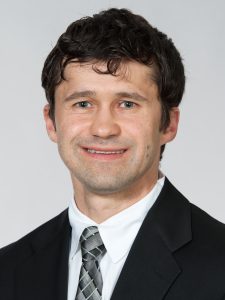Meeting Patients Where They Are: Building Community Through Access
Ziemowit Mazur, PhD, EdM, PA-C, DFAAPA
2022 William H. Marquardt Community Health Access Fellow
February 17, 2023

Community has a huge impact on the success of health outcomes. Nearly 80% of the factors present within a patient’s community determine those health outcomes. Only around 20% of the variation in population health outcomes is based on medical care alone.1 The impact of social determinants of health (SDOH) on health outcomes cannot be ignored. It behooves PAs to connect with patients on a deeper level to maximize health outcomes, establish rapport, and build lasting relationships with patients. As a PA, I’ve had unique opportunities to offer primary care in the outpatient clinical setting, inside patient homes, and out in the community. In the process, I became acutely aware of the unaddressed variables accounting for about 80% of health outcomes and how we can meet patients where they are.
Mobile Clinics & House Calls: Interprofessional Team Approach
Mobile clinics bring the medical team to patients in their communities and maximize access to care. Through grant funding, the Community Care Connection (CCC) mobile clinic program brings free health services to medically underserved, hard-to-reach patients at more than 30 sites throughout Lake County, Illinois. We connected community members that might have difficulty accessing care through traditional healthcare delivery models, whether due to finances, chronic medical conditions, lack of transportation, or childcare issues, to essential care.
Our interprofessional team included PAs and Advanced Practice Nurses (APNs) and traveled to community sites including village halls, senior centers, shelters, churches, libraries, food pantries, community festivals, community centers, and schools to make access more equitable. Health education and chronic disease prevention underpinned our work. Our team provided access to various free health screenings, including diabetes, cardiovascular disease, and osteoporosis. Based on the results, continuity of care for patients was maintained by providing assistance in finding primary or specialty care clinics.
Another way to increase access to care is through making house calls to the homebound elderly. These patients are unable to leave their homes without “considerable and taxing effort.” By coming to them, I not only increased their access to care; I also gained understanding and insight into making their care more successful by meeting them where they spend most of their time. Home-based primary care is certainly not a novel idea and is seeing a resurgence in some areas of healthcare. This healthcare delivery model offers several advantages over the hospital and care-facility-based models. By meeting the patient where they live, providers gain critical insight into their environment, habits, and support systems. Each clinical decision is made with a comprehensive understanding of the patient and caregiver’s needs and goals. Furthermore, house calls reinforce ideals of team-based care, with primary care providers collaborating with skilled nursing, physical, occupational, and speech therapists to optimize patient outcomes.
Our interprofessional teams worked together, utilizing our skills, knowledge, and varying approaches to assess and treat patients. As a team, we gained unique insight and experience on how community impacts SODH on health outcomes; how our knowledge and praxis might differ, but together, we can provide the highest and most comprehensive level of care to patients. In addition, community resources, like the CCC mobile clinic, serve as unique training sites for PA students and students of other healthcare programs to build lasting and supporting networks. This interprofessional team approach has helped patients, caregivers, students, and fellow health professionals feel supported.
Interprofessional Community Clinic: A North Chicago Student-led Initiative
To establish continuity of care for patients seen in the CCC mobile clinic, patients were often referred to the Interprofessional Community Clinic (ICC). Created through a student initiative at Rosalind Franklin University of Medicine and Science, this pro-bono clinic serves the greater North Chicago, Illinois community. Like the CCC, students across all degree programs work with licensed professionals to establish and continue care. Health professional students in allopathic medicine, pharmacy, PA, physical therapy, clinical psychology, and podiatric programs provide medical services ranging from primary care and behavioral health counseling to health coaching. This interprofessional team extends patient care established through CCC mobile clinic and community outreach initiatives. Patients see familiar faces, and providers build trusting relationships that help to foster continued care and improvements in treatment adherence. Similar to CCC mobile clinic, at the ICC, referral to specialty care clinics was also supported. As a volunteer clinician at the ICC since 2013 at the ICC, I often cared for the same patients I referred earlier through the CCC mobile clinic to establish a primary care home. This provided continuity of care and a familiar face to better connect and establish a relationship with my patients. The ICC, with the CCC, provides multiple healthcare services in one place. Having all of these specialties in one location further improves access to care. Patients can be seen the same day for an issue just by going down the hall. For providers, it creates an opportunity to highlight the value of a team-based interprofessional approach to a patient’s care. A team-based approach results in better patient outcomes, and improved student attitudes towards interprofessional healthcare, alongside increased student learning and engagement opportunities.
Team-based care and interprofessional relationships were integral to the successful treatment of patients at the onset of the COVID-19 pandemic. While COVID-19 temporarily disrupted ICC operations, it created an opportunity to serve patients differently. As a member of the Faculty and Administration Board at the ICC, our committee supported students with the transition of clinical operations to a telehealth modality. It turned out telehealth reduced barriers like lack of transportation and childcare, along with sick-leave availability for healthcare appointments; at the same time, it increased our awareness of other barriers, like the availability of necessary technology and internet connection stability. Today, ICC continues to meet patients where they are, providing telehealth and in-person appointments. Change creates opportunity, and necessary changes to visit modality ultimately led to improvements in access to care.
I am honored and humbled to be the recipient of the 2022 William H. Marquardt Community Health Access Fellowship, which recognizes commitment to primary care for the underserved and improving access to care. As an immigrant from Poland, I am personally invested in ensuring access to care and the provision of culturally appropriate care. Funding obtained from the William H. Marquardt Fellowship Award was allocated to support essential services provided at the ICC clinic, including vaccines, interpreter certifications, diabetic shoes, and telehealth infrastructure. Ensuring access to care and serving those less fortunate is part of every PA’s DNA, and we can all strive to “meet patients where they are.”
Reference
- Hood CM, Gennuso KP, Swain GR, Catlin BB. County Health Rankings: Relationships Between Determinant Factors and Health Outcomes. Am J Prev Med. 2016;50(2):129-135. doi:10.1016/j.amepre.2015.08.024

